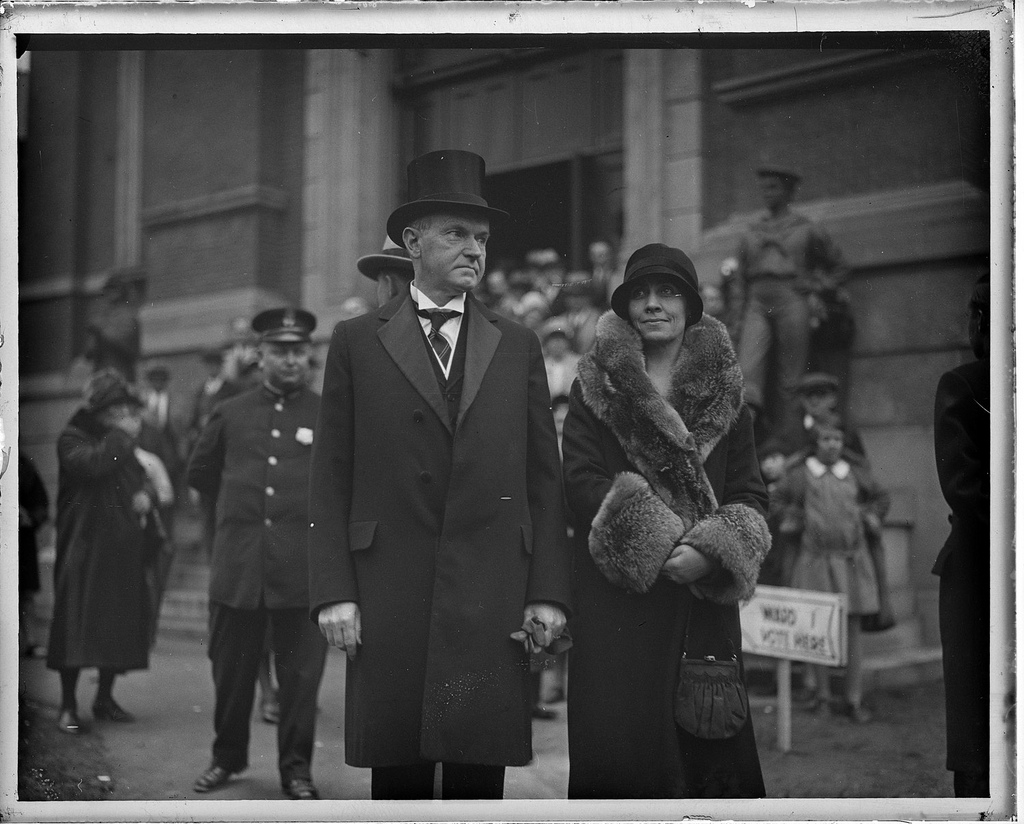Here is an awesome half-hour presentation of the life and landmark accomplishments of Calvin Coolidge by superb scholar Jerry Wallace to the Wichita Pachyderm Club. His irreplaceable volume Calvin Coolidge: Our First Radio President has contributed so much toward shattering the myth that Cal was too inept and silent to make use of the new medium of radio. In fact, Mr. Wallace explains that far from being a failure, Calvin Coolidge bequeaths an historic legacy as not only a masterful communicator but effectual doer and successful President. This is well worth the listen!
the press
On Being “Progressive”
Asked to define the terms “reactionary” and “progressive” during one of his 521 press conferences, President Coolidge responded that his answer would likely not be helpful. After all, the definition was in the “eye” of the definer. Having experienced the back and forth of politics for twenty years before even reaching the White House, Coolidge had seen just about everything. Illustrating his point, he explained, “That reminds me a little of the old definition of ‘orthodoxy’ and ‘heterodoxy.’ I think they used to say that ‘orthodoxy’ was ‘my doxy’ and ‘heterodoxy’ was ‘your doxy.’ Sometimes the person is not well thought of and he is labeled as a reactionary. Sometimes if he is well thought of he is called a progressive. As a matter of fact all the political parties are progressive” (The Talkative President, p.9).
This was not some cynical resignation to the “way the real world works” but rather a refusal to surrender the term progress to be freely redefined and misappropriated by any one side of the political arena. The word carried a positive good and he would not be drawn in to an acceptance of a false premise. Coolidge did not stop there. One of his most profound contributions to the science of political thought revolves around the enduring importance political parties do have in our system. “I can’t conceive of a party existing for any length of time that wasn’t progressive, or of leadership being effective that wasn’t progressive.”
The key is not a denial of progress, or an eradication of all that has preceded us but rather connecting founding truths to our current situation. Progress is not progress which cuts all ties with the universal truths encapsulated in our Declaration and applied in our Constitution. This seemingly paradoxical concept for a progress that retains long-established, foundational ideals is expressed when Coolidge, two years later, said, “It is often asserted that the world has made a great deal of progress since 1776, that we have had new thoughts and new experiences which have given us a great advance over the people of that day, and that we may therefore very well discard their conclusions for something more modern. But that reasoning can not be applied to this great charter. If all men are created equal, that is final. If they are endowed with inalienable rights, that is final. If governments derive their just powers from the consent of the governed, that is final. No advance, no progress can be made beyond these propositions. If anyone wishes to deny their truth or their soundness, the only direction which he can proceed historically is not forward, but backward toward the time when there was no equality, no rights of the individual, no rule of the people. Those who wish to proceed in that direction can not lay claim to progress. They are reactionary. Their ideas are not more modern, but more ancient, than those of the Revolutionary fathers.” Quite a profundity from a man inaccurately and unfairly dismissed as an intellectual lightweight, characterized as a “do-nothing” president and classified as a vapid reactionary, don’t you agree?
“The Calvin Coolidge Presidential Foundation”
Here is an excellent recap of the first Coolidge Gala Dinner held last November. We look forward to many more to come. The fresh introduction to Calvin Coolidge for many who do not know who he is, what he accomplished and why he is important is thrilling to behold.
What a tremendous way to bring back our thirtieth President from an unjust “exile” by historians and to relearn the principles of limited government, engaged citizenship, and fiscal discipline by which he lived and led. These truths, along with many others, lack none of the necessity or power now than they did in his time. This is NOT out of some simplistic nostalgia about the “good old days” but rather strikes at something far more profound and fundamental: A government held to proper limits by a sovereign citizenry is the only foundation for social progress, economic opportunity and individual liberty.
In this period where so many assume “Big Government” is permanently here to handle every human contingency, we are inescapably bound by the reality of Coolidge’s precepts. As much as we may wish otherwise, we cannot indefinitely spend what we do not have just as we cannot reap what we have not sown, whether as individuals or nations. We have no more outgrown Coolidge’s belief in self-government, exemplified by such virtues as hard work, personal initiative and self-control, than the earth has outgrown a need for the sun.
As Mr. Cal Thomas, quoting his Presidential namesake, brings to our attention, “We can not continue to enjoy the result” of all our success “if we neglect and abandon the cause.”
